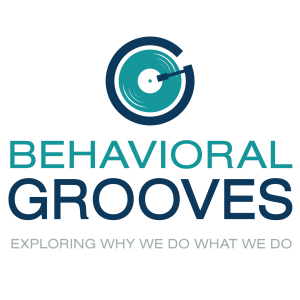
Stories, science and secrets from the world’s brightest thought-leaders. Behavioral Grooves is the podcast that satisfies your curiosity of why we do what we do. Explanations of human behavior that will improve your relationships, your wellbeing, and your organization by helping you find your groove.
Episodes

Sunday Dec 19, 2021
Sunday Dec 19, 2021
Applying Behavioral Science insights at work takes more than just another checklist or document, it’s about creating an environment that enables people to make good decisions. Torben Emmerling specializes in innovative, evidence-based strategies for behavior change. We discuss with him the nuances that differentiate applied behavioral science from academic behavioral science.
As a consultant for both private and public organizations, Torben doesn’t focus on a specific industry. Instead, he's a human behavior expert. What motivates people and what prompts individuals to change their behavior can be applied in any industry. For example, the same contextual factors that make us forget to buy milk on the way home from work, can be applicable in organizational decisions and performance.
We hope you enjoy our conversation with Torben and if you do, please leave a short review of our podcast. Reading your comments, never fails to put a smile on our faces!
Topics
(4:44) Welcome to Torben Emmerling and speed round.
(8:59) How behavioral science can be used to help people save energy.
(14:34) Why applied behavioral science can be very different than academic behavioral science.
(16:42) How Torben’s work uses applied behavioral science.
(18:33) Behavioral science tools aren’t industry specific.
(21:53) Why behavioral science needs to be more than just checklists and documents.
(27:16) What the airline industry can teach us about reflecting on errors.
(29:45) The importance of creating psychological safety at work.
(31:48) How organizations have used behavioral science to manage remote working during COVID-19.
(36:34) What is on Torben’s playlist?
(39:07) Grooving Session with Kurt and Tim discussing how to apply Torben’s insights.
© 2021 Behavioral Grooves
Links
Opinion Science Podcast: http://opinionsciencepodcast.com/
Winter Camp 2022: https://fb.me/e/217RQdNQh
Torben Emmerling: https://www.linkedin.com/in/torben-emmerling/
Daniel Kahneman: https://en.wikipedia.org/wiki/Daniel_Kahneman
“5 Behavioral Biases That Trip Up Remote Managers”: https://hbr.org/2021/06/5-behavioral-biases-that-trip-up-remote-managers
Episode 170, “Seven Questions to Assess the Psychological Safety of Your Teams with Susan Hunt Stevens”: https://behavioralgrooves.com/episode/seven-questions-to-assess-the-psychological-safety-of-your-teams-with-susan-hunt-stevens/
Peak-end rule: https://en.wikipedia.org/wiki/Peak%E2%80%93end_rule
Rory Sutherland, “Transport for Humans”: https://amzn.to/3swG5xN
Episode 107, Rory Sutherland “The Opposite of a Good Idea is a Good Idea”: https://behavioralgrooves.com/episode/rory-sutherland-the-opposite-of-a-good-idea-is-a-good-idea/
Musical Links
Nas, “Nas is Like”: https://www.youtube.com/watch?v=VC4ORS5n9Hg&ab_channel=NasVEVO
The Black Keys, “Howlin' For You”: https://www.youtube.com/watch?v=TLSpj7q6_mM&ab_channel=TheBlackKeys

Sunday Dec 12, 2021
Our Love Of Music And The Influence Of The Pandemic With Mark Thorley
Sunday Dec 12, 2021
Sunday Dec 12, 2021
Where and how we listened to music shifted during the pandemic. But the music industry itself had to quickly adapt in 2020 to how music was recorded and produced. Our very musical conversation with guest Mark Thorley delves into the changes that COVID brought to remote working and how people’s relationships with music have changed in recent months.
There is no greater joy for Tim than discussing music with our guests, and you can see from the musical links on this episode, that our conversation with Mark covers a multitude of musical genres! Our relaxed discussion with Mark swings off into many musical tangents and Mark even manages to turn his own speed round question back on Tim and Kurt. Listen in to find out which musical star they both would choose to have dinner with!
Mark has coined the phrase “remotivity” to embody the concept of working on music, whether it be recording or producing, in a remote setting. But this goes further than just having a working WiFi connection or a Zoom meeting set up. There are four key skills needed to work remotely in music; innovation, technical expertise, a fan base, and a unique selling point. We explore each of these four elements in detail with Mark.
Topics
- Welcome and speed round.
- Hearing the same music at different stages can alter our listening experience.
- How has the pandemic shifted how music is recorded and consumed?
- Working from home has come full circle.
- The mental health toll of working from home.
- The 4 skills needed for working remotely in music.
Links
Wally Heider: https://en.wikipedia.org/wiki/Wally_Heider
Rupert Neve: https://en.wikipedia.org/wiki/Rupert_Neve
Rudy Van Gelder: https://en.wikipedia.org/wiki/Rudy_Van_Gelder
Les Paul: https://en.wikipedia.org/wiki/Les_Paul
Joe Meek: https://en.wikipedia.org/wiki/Joe_Meek
Episode 219: Why Music Makes You Feel Better with Pablo Ripollés and Ernest Mas Herrero: https://behavioralgrooves.com/episode/why-music-makes-you-feel-better/
Episode 82, Chris Matyszczyk: Listening to Music While You Work: https://behavioralgrooves.com/episode/chris-matyszczyk-listening-to-music-while-you-work/
Musical Links
Kylie Minogue “I Should Be So Lucky”: https://www.youtube.com/watch?v=3_TvpBwSZDM
Hot Chocolate “You Sexy Thing”: https://www.youtube.com/watch?v=E3fX2_bxEkg
Madonna “Material Girl”: https://www.youtube.com/watch?v=6p-lDYPR2P8
Quincy Jones “Summer in the City 1973”: https://www.youtube.com/watch?v=6xN3KOY2kbg
Chicane “Hello, Goodbye”: https://www.youtube.com/watch?v=1iTHBBv0n5c
James Brown “Get On Up”: https://www.youtube.com/watch?v=BCCkb6k_aow
Chuck Berry “Johnny B Goode”: https://www.youtube.com/watch?v=T38v3-SSGcM
Nina Simone “Feeling Good”: https://www.youtube.com/watch?v=oHRNrgDIJfo
U2 “I Will Follow”: https://www.youtube.com/watch?v=DSJYerDbdjc
Ministry “Search and Destroy”: https://www.youtube.com/watch?v=psHDeiXRVwQ
Charlie Mingus “Moanin’”: https://www.youtube.com/watch?v=__OSyznVDOY”
Echo and The BunnyMen “The Killing Men”: https://www.youtube.com/watch?v=LWz0JC7afNQ
Steely Dan “More Than Just a Band”: https://www.youtube.com/watch?v=SjXB894CZnM
UB40 “Red. Red Wine”: https://www.youtube.com/watch?v=zXt56MB-3vc
“The 1919 Influenza Blues”: https://www.youtube.com/watch?v=6Y_7B1cCvjk

Thursday Dec 09, 2021
Please Help Us by Voting for Behavioral Grooves - it takes 10 seconds
Thursday Dec 09, 2021
Thursday Dec 09, 2021
Habit Weekly, a wonderful organization founded by Samuel Salzer, is asking people to weigh in on their favorite podcast by casting a vote at https://www.habitweekly.com/awards. Kurt and Tim are asking for your vote since you (and lots of other people) voted for Behavioral Grooves in 2021 making it the Number One Behavioral Science Podcast in 2021. We’d like to maintain that spot in the upcoming year and all we need is your vote.
It takes less than 10 seconds.
With more than 260 episodes under our belt and listeners in more than 120 countries, we hope you find some things about Behavioral Grooves to be worth voting for.
Please cast your vote for your favorite podcast at: https://www.habitweekly.com/awards

Sunday Dec 05, 2021
Trust: The Four Key Steps to Genuinely Build It | Sandra Sucher
Sunday Dec 05, 2021
Sunday Dec 05, 2021
In 2021, people started to trust business organizations more than governments, NGOs or the media, according to global research by the Edelman Trust Baraometer. The Covid pandemic has seen people around the globe question their trust in all forms of leadership. What impact does this have on business leaders? Can organizations rebuild trust? What are the building blocks of trust?
Sandra Sucher, co-author of “The Power of Trust: How Companies Build It, Lose It, Regain It” (https://amzn.to/3pny7Uu) draws back the layers of what trust actually is, how to build it, how to maintain it through adversity, and most importantly, how to rebuild it when it’s been shattered.
Along with her co-author, Shalene Gupta, Sandra has devised the four key foundations of trust; competence, motives, means and impact. We ask Sandra about the significance of these steps, how they can be harnessed, as well as the impact on trust that Covid has had, specifically how vaccine mandates have affected it. Throughout our conversation and her book, Sandra illustrates her insights with a plethora of rich business examples.
If you are a regular listener to Behavioral Grooves, you can become a special Behavioral Grooves Patreon member by donating to our work: https://www.patreon.com/behavioralgrooves. And a particular thanks to some of our listeners who have recently left us glowing podcast reviews, we really appreciate them. We'd love it if more our listeners could take 2 minutes to write a short review of Behavioral Grooves. Thanks!
Topics
(3:03) Welcome and speed round question.
(5:00) Trust is limited.
(7:38) The 4 key elements of trust.
(13:09) Does forgiveness play a part in regaining trust?
(14:54) How trust can be preserved by an organization, even while laying people off - the Nokia example.
(25:30) How has the landscape of trust changed and what effect has the pandemic had on trust?
(30:27) The link between lack of trust in government and vaccine hesitancy.
(33:49) The trust implications of asking employees to get vaccinated.
(36:26) People actually trust a negative outcome, if they feel the process was fair.
(39:37) What makes a business a good place to be from?
(45:39) Grooving Session discussing what we’ve learnt from Sandra.
© 2021 Behavioral Grooves
Links
Sandra Sucher, “The Power of Trust: How Companies Build It, Lose It, Regain It”: https://amzn.to/3pny7Uu
Esko Aho, Nokia: https://en.wikipedia.org/wiki/Esko_Aho
Amy Edmondson, Psychological Safety: https://www.hbs.edu/faculty/Pages/profile.aspx?facId=6451
Edelman Trust Barometer: https://www.edelman.com/trust/2021-trust-barometer
Shalene Gupta: https://shalenegupta.com/
“Worried About the Great Resignation? Be a Good Company to Come From” by Sandra J. Sucher and Shalene Gupta: ttps://hbswk.hbs.edu/item/worried-about-the-great-resignation-be-a-good-company-to-come-from
Recruit Holdings in Japan: https://recruit-holdings.com/
Episode 102, Cristina Bicchieri: Social Norms are Bundles of Expectations: https://behavioralgrooves.com/episode/cristina-bicchieri-social-norms-are-bundles-of-expectations/
Musical Links
Aretha Franklin “R.E.S.P.E.C.T.”: https://www.youtube.com/watch?v=6FOUqQt3Kg0&ab_channel=TatanBrown

Sunday Nov 28, 2021
Sunday Nov 28, 2021
If we are open minded, we challenge our beliefs and accept that our thinking can, at times, be misguided. After all, our thoughts are merely a function of our personal habits, experiences and internal communication. Dr Howard Rankin PhD encourages us to recognize the value of critical thinking, and become more aware of our own consciousness.
To conclude our November series on Conspiracy Theories, our guest on this episode, Dr. Howard Rankin PhD, talks about how our consciousness has been conditioned. By understanding how the thinking process works and being aware of our own consciousness, we gain more perspective on our beliefs. So we should focus more on HOW to think, and less on WHAT to think.
Howard is an inspirational educator on the subjects of mind-body medicine, spirituality, neuropsychology and cognitive function, personal change and transformation. Frequently appearing on radio, TV and podcasts, Howard is also an author. His latest book, "I Think Therefore I Am Wrong: A Guide to Bias, Political Correctness, Fake News and the Future of Mankind" (https://amzn.to/3DXNTLM) shines light on the human thought process and how it can often be seriously flawed.
If you are a regular listener to Behavioral Grooves, please consider donating to our work through the Behavioral Grooves Patreon page: https://www.patreon.com/behavioralgrooves. Also leaving a short review on our podcast really helps others to find our content, thanks.
Topics
(3:52) Welcome and speed round questions.
(10:50) Is there a difference between OUR reality and THE reality?
(17:34) Why do we underestimate critical thinking?
(25:19) Can social norms influence what we consider to be true?
(27:37) How do we reconcile our need for certainty?
(28:27) How do we challenge our own beliefs?
(35:58) Challenging ourselves on not WHAT to think but HOW to think.
(37:37) How we can focus education on how to think, not what to think.
(43:30) What music makes Howard think?
(49:08) How you can learn more about Howard’s work.
(49:58) Grooving Session with Kurt and Tim discussing how they are wrong!
© 2021 Behavioral Grooves
Links
Leading Human™ Workbook and Playbook: https://www.behavioralgrooves-store.com/products/copy-of-the-leading-human-playbook-workbook-package
Leading Human™, Free Whitepaper Download: https://www.behavioralgrooves-store.com/collections/leading-human/products/human-centered-workplace-checklist
Promo Code: GROOVERS to receive $20 off (limited time offer for listeners).
Dr. Howard Rankin PhD, "I Think Therefore I Am Wrong: A Guide to Bias, Political Correctness, Fake News and the Future of Mankind": https://amzn.to/3DXNTLM
Dr. Howard Rankin PhD: https://www.drhowardjrankin.com/
I Think Therefore I Am Wrong Website: www.ithinkthereforeiamwrong.com
How Not to Think Podcast: https://podcasts.apple.com/us/podcast/how-not-to-think/id1488982079
YouTube channel – Howard Rankin: https://www.youtube.com/c/howardrankin
Clayton Kershaw: https://en.wikipedia.org/wiki/Clayton_Kershaw
Joe Montana: https://en.wikipedia.org/wiki/Joe_Montana
Episode 176, Annie Duke on How to Decide: https://behavioralgrooves.com/episode/annie-duke-on-how-to-decide/
George Box: https://en.wikipedia.org/wiki/George_E._P._Box
Bayesian Theory: https://en.wikipedia.org/wiki/Bayesian_probability
Musical Links
Mozart “Requiem”: https://www.youtube.com/watch?v=Zi8vJ_lMxQI
The Beatles “Help”: https://www.youtube.com/watch?v=2Q_ZzBGPdqE
Jimi Hendrix “Purple Haze”: https://www.youtube.com/watch?v=WGoDaYjdfSg

Wednesday Nov 24, 2021
Need a Laugh to Get Through Your Workday? Dan Hill
Wednesday Nov 24, 2021
Wednesday Nov 24, 2021
Need some respite from the work day grind? Join the fun on this episode for a light-hearted take on workplace humor. Dan Hill delivers a real tongue-in-cheek take on the corporate lingo and jargon that infiltrates our workplaces. But with every joke he makes, there is a pang of truth: “emojis; the feelings you would be having at work if they were allowed.”
Dan’s new book; “Blah, Blah, Blah: A Snarky Guide to Office Lingo” (https://amzn.to/3nB3hYB) is written in collaboration with over 50 contributors from across the world (including our one and only Tim Houlihan!) who have collectively provided almost 600 definitions of how the workplace really operates.
Our conversation with Dan is not just hilariously funny, he also cracks open the truth on workplace humor being an effective way of tackling serious goals. With this "snarky" book Dan wants to bring the issues of bullying and inequality in the workplace to the forefront of peoples minds. So why use humor to address such momentous issues? In Dan's own words, humor can open your eyes: “A good cartoon, a good joke, I think really captures the essence of a situation, and it does open you up, it's got that aha, twist and turn to a phrase a concept. When we're surprised our eyes go wider, our mouth drops open and means we shut up and we notice the world around us. So I am trying for that element of surprise.”
Welcoming Dan back to Behavioral Grooves in this episode was simply a barrel of laughs for us. But please note, that our discussion contains some language you might not want your kids to hear.
We really do have a lot of fun creating the Behavioral Grooves Podcast, but like Dan said “having fun IS hard work!”. If you’d like to chip in with our work, please consider becoming a monthly contributor at our Patreon site: https://www.patreon.com/behavioralgrooves. Becoming a special Behavioral Grooves Patreon will open up some exclusive show content just for you!
Topics
(4:32) Welcome and speed round questions.
(11:20) Addressing the fact that 20-25% of managers are bullies.
(14:43) Dan reads entries from his snarky book!
(15:47) What is the devil’s dictionary?
(17:59) Using humor to open people's eyes.
(21:30) How Dan is tackling inequality in the workplace with humor.
(29:11) Grooving with Tim and Kurt on what funny things we learnt from Dan’s interview.
© 2021 Behavioral Grooves
Links
“Blah, Blah, Blah: A Snarky Guide to Office Lingo” by Dan Hill, Howard Moskowitz, James Monroe: https://amzn.to/3nB3hYB
“Emotionomics: Leveraging Emotions for Business Success” by Dan Hill: https://amzn.to/3FONtbb
“Famous Faces Decoded: A Guidebook for Reading Others” by Dan Hill: https://amzn.to/3nL5eli
Dan Hill, Episode 151: On the Facial Coding of Trump, Hendrix, Prince, Gretzky and the Beatles: https://behavioralgrooves.com/episode/facial-coding-of-trump/
Dan Hill's EQ Spotlight Podcast: https://podcasts.apple.com/us/podcast/dan-hills-eq-spotlight/id1519669707
John McEnroe: https://en.wikipedia.org/wiki/John_McEnroe
The Devil's Dictionary : https://en.wikipedia.org/wiki/The_Devil%27s_Dictionary
Vanessa Bohns, Episode 253. Why You Don‘t Need to be Powerful to be Influential: https://behavioralgrooves.com/episode/influence-vanessa-bohns/
Patreon Site for Behavioral Grooves: https://www.patreon.com/behavioralgrooves
Musical Links
Bob Dylan “The Times are A-Changin’”: https://www.youtube.com/watch?v=90WD_ats6eE
The Beatles “Hard Days Night”: https://www.youtube.com/watch?v=Yjyj8qnqkYI

Sunday Nov 21, 2021
Feeling Fearful: Why People Seek Out Conspiracy Theories | Eric Oliver
Sunday Nov 21, 2021
Sunday Nov 21, 2021
What makes us more likely to believe in conspiracy theories? Can our religious beliefs or political affiliations determine whether we're less likely to believe in scientific facts? Why are health conspiracy theories some of the most widely believed notions? We revisit a conversation with Eric Oliver who talks us through the factors that drive people towards conspiracy theories.
Eric Oliver, PhD is a Professor of Political Science at the University of Chicago. Although the majority of his work is squarely in the realm of how we view our political systems and make political decisions, some of his work echoes moral psychology and sociology, and we find it fascinating. And, frankly, some of it is just downright fun to talk about.
Eric’s observations come from more than 20 years of research, dozens of peer-reviewed papers, and he is the author of 5 books on political science. We specifically talked about how liberals and conservatives name their children, the rise of intuitionism, having dinner with a sports star rather than a rock star, and of course, he spoke in-depth about conspiracy theories.
Most importantly, he walked us through some key aspects of how to have a conversation with someone who is on the opposite side of the conspiracy-theory belief system and, interestingly enough, it begins with empathy. Listen to the entire episode to hear all his insights and research anecdotes. They’ll put a smile on your face as well as fresh ideas into your brain!
We have been fans of his work for some time and are grateful that Eric shared his insights with us. We think you’ll become a fan, too, if you’re not already one.
[NOTE: This episode is republished from our interview with Eric in episode #172 from Sept 2020.]
© 2021 Behavioral Grooves
Topics
(3:17) Welcome and speed round.
(10:17) What characteristics predict whether you will believe in conspiracy theories?
(19:24) People rely on heuristics in times of uncertainty.
(24:48) Have conspiracy theories increased since Covid?
(27:03) What factors make us more likely to believe conspiracy theories?
(32:36) Do religious people tend to believe more in conspiracy theories?
(38:47) Why Donald Trump appeals to conspiracy theorists.
(42:50) How to talk to your relatives about their conspiracy theories?
(45:33) What music does Eric listen to?
(53:19) Grooving session with Tim and Kurt discussing Eric's work.
Links
Eric Oliver, PhD: https://political-science.uchicago.edu/directory/eric-oliver
Jonathan Haidt, PhD: https://en.wikipedia.org/wiki/Jonathan_Haidt
James Frazer, “The Golden Bough”: https://en.wikipedia.org/wiki/The_Golden_Bough
Katherine Surma on Credulity: https://www.jericoliver.com/uploads/1/1/8/9/118973414/surmaoliver3.5.18-final.pdf
Laurie Santos, PhD: The Joe Effect: https://www.youtube.com/watch?v=GimHHAID_P0
Steve Kerr: https://en.wikipedia.org/wiki/Steve_Kerr
Colin Kaepernick: https://en.wikipedia.org/wiki/Colin_Kaepernick
Charles Manson: https://en.wikipedia.org/wiki/Charles_Manson
Andy Luttrell, Episode 175: Pro’s and Con’s of Persuasion When Issues are Moralized: https://behavioralgrooves.com/episode/andy-luttrell-pros-and-cons-of-persuasion-when-issues-are-moralized/
Kwame Christian, Episode 178: On Compassionate Curiosity, Social Justice Conversations, and Cinnamon Toast Crunch: https://behavioralgrooves.com/episode/kwame-christian-on-compassionate-curiosity-social-justice-conversations-and-cinnamon-toast-crunch/
Musical Links
LCD Sound System: https://www.youtube.com/watch?v=lqq3BtGrpU8
Kurt Weil: https://en.wikipedia.org/wiki/Kurt_Weill
Phillip Glass: https://www.youtube.com/watch?v=M73x3O7dhmg
Keith Richards and Chuck Berry: https://www.youtube.com/watch?v=ERVLy-ltjHs

Sunday Nov 14, 2021
Sunday Nov 14, 2021
Misinformation is like a virus, spreading quickly and propagating in a way that doesn’t benefit its host. Andy Noman describes harmful ideas as acting like “mind parasites” that deploy clever tactics to infect our thinking by circumventing our mental immune systems. And we’re even more susceptible to bad ideas than we realize.
So how do we immunize ourselves against mind parasites? Can we reach herd immunity? Can we critically think our way out of this epidemic of unreason? After 30 years of research on this topic, Andy has concluded that the traditional models of critical thinking are not up to the task in our hyper-connected world. We need a more comprehensive framework for inoculating our minds against viral nonsense.
Andy Norman is an award-winning author who teaches philosophy at Pittsburgh’s Carnegie Mellon University. He has recently published his new book, “Mental Immunity: Infectious Ideas, Mind-Parasites, and the Search for a Better Way to Think”: https://amzn.to/3o6OjbU. We are thrilled to welcome Andy as part of our series on understanding more about Conspiracy Theories. Our conversation with Andy reveals details of his framework for strengthening our own mental immunity. We hope you enjoy listening!
Subscribe to Behavioral Grooves on your podcast player so you are notified about our new episodes. Next week we will be hearing from Prof. Eric Oliver about how to talk to our friends and family about conspiracy theories.
If you are a regular listener to Behavioral Grooves, please consider donating to our work through our Behavioral Grooves Patreon page: https://www.patreon.com/behavioralgrooves. We also love reading your reviews on the podcast, which help others find our content.
Topics
(3:37) Welcome and speed round questions.
(6:20) We are experiencing an epidemic of unreason.
(8:17) How can we immunize ourselves against disinformation?
(14:10) How our identity can affect our mental immunity.
(17:54) A framework for mental immunity.
(21:11) Thinking in probabilities instead of in black & white.
(26:08) Why acknowledging other people's truths can have a surprising effect.
(29:38) The objective difference between a good idea and a bad idea.
(32:25) Arguing with someone who only cares about themselves.
(38:54) Is there a chance we will reach mental herd immunity?
(44:13) What music is on Andy’s playlist?
(47:11) Grooving Session with Kurt and Tim talking about how to apply Andy’s work.
© 2021 Behavioral Grooves
Links
“Mental Immunity: Infectious Ideas, Mind-Parasites, and the Search for a Better Way to Think” by Andy Norman: https://amzn.to/3o6OjbU
Ludwig Wittgenstein: https://en.wikipedia.org/wiki/Ludwig_Wittgenstein
Socrates: https://en.wikipedia.org/wiki/Socrates
Dan Kahan, “Identity Protective Cognition”: https://bit.ly/2YxM3Sk
Episode 176: Annie Duke on How to Decide: https://behavioralgrooves.com/episode/annie-duke-on-how-to-decide/
Musical Links
Mark Knopfler “Piper to the End”: https://www.youtube.com/watch?v=XsrKWwx3x7o

Sunday Nov 07, 2021
Conspiracy Theories: How To Talk to A Science Denier | Lee McIntyre
Sunday Nov 07, 2021
Sunday Nov 07, 2021
How do you respond to someone who says “the earth is flat” or “Covid is a hoax”? Before we can try and reason with conspiracy theorists, we must first understand the reason they have ventured down that path. Lee McIntyre has spent years researching science deniers and has found a common set of traits in their behavior. He also argues that we shouldn’t sit back and assume conspiracy theories are harmless. Find out more from Lee in this episode about how to talk with science deniers and how even to change their minds about the facts.
Our Conspiracy Theories Series continues this month with Lee McIntyre, author of the new book “How to Talk to a Science Denier: Conversations with Flat Earthers, Climate Deniers, and Others Who Defy Reason”: https://amzn.to/3qaV134. To gather research for the book, Lee attended a flat earth convention to understand more about the followers who believe in the flat earth conspiracy. His findings are enlightening.
Lee is a Research Fellow at the Center for Philosophy and History of Science at Boston University and an Instructor in Ethics at Harvard Extension School. He’s had a distinguished career in teaching and researching issues that we found fascinating.
Next week we continue our Conspiracy Theories Series with Andy Norman, author of the enthralling new book, “Mental Immunity: Infectious Ideas, Mind-Parasites, and the Search for a Better Way to Think”: https://amzn.to/3o6OjbU. We learn about how bad ideas can infect our minds and how we can boost our own mental immunity. Subscribe to Behavioral Grooves on your podcast player so you’re the first to be notified when we publish a new episode.
Topics
(9:33) Speed Round
(11:36) Lee’s experience attending a Flat Earth Convention.
(14:56) How people become convinced by conspiracy theories.
(17:09) The value of having face to face conversations.
(22:10) How to have those difficult conversations with your family and friends.
(26:08) The 5 common traits of science deniers.
(31:31) Is the educational system really teaching us about how science works?
(36:23) Why should we take science deniers seriously?
(38:53) Why is science denial growing?
(43:27) Political identity and science denial.
(58:14) The music that got Lee through Covid
(1:06:14) Grooving Session with Tim and Kurt discussing what they talked about with Lee.
© 2021 Behavioral Grooves
Links
“How to Talk to a Science Denier: Conversations with Flat Earthers, Climate Deniers, and Others Who Defy Reason” by Lee McIntyre: https://amzn.to/3qaV134
McIntyre, L. “Calling all Physicists” American Journal of Physics 87, 694 (2019); https://doi.org/10.1119/1.5117828
Beyond the Curve documentary: https://www.netflix.com/title/81015076
“Merchants of Doubt: How a Handful of Scientists Obscured the Truth on Issues from Tobacco Smoke to Climate Change” by Naomi Oreskes and Erik M. Conway: https://amzn.to/3q39Y7m
Cranky Uncle: https://crankyuncle.com/
You’re Not So Smart Podcast: https://youarenotsosmart.com/podcast/
Behavioral Grooves Patreon page: https://www.patreon.com/behavioralgrooves
Musical Links
The Beatles “Here Comes the Sun”: https://www.youtube.com/watch?v=KQetemT1sWc
The Beatles “While My Guitar Gently Weeps”: https://www.youtube.com/watch?v=VJDJs9dumZI
The Beatles “Something”: https://www.youtube.com/watch?v=UelDrZ1aFeY
The Beatles “Blackbird”: https://www.youtube.com/watch?v=Man4Xw8Xypo
The Beatles “Hide your Love Away”: https://www.youtube.com/watch?v=V8nLraecPRY
The Beatles, The Medley on the Flipside of Abbey Road: https://www.youtube.com/watch?v=pAIUxGn9lCI
The Beatles “Because”: https://www.youtube.com/watch?v=hL0tnrl2L_U
The Beatles “Strawberry Fields Forever”: https://www.youtube.com/watch?v=HtUH9z_Oey8

Wednesday Nov 03, 2021
Conspiracy Theories: Hidden Brain‘s Shankar Vedantam | The Delusion of Nations
Wednesday Nov 03, 2021
Wednesday Nov 03, 2021
Host of Hidden Brain podcast, Shankar Vedantam talks with us about the powers: both useful and harmful, of our delusional thinking. Nations are an example of useful delusions; they are an entirely human-made construct, yet they can present us with a unifying, shared identity.
There is a tipping point, however, at which our beliefs can become harmful to someone else. Shankar defines conspiracy theories as a particular type of self deception which can easily escalate into harmful behavior.
Our conversation with Shankar touches on the Capitol Riots in Washington DC on January 6th 2021, and how conspiracy theories influenced the behavior of the rioters.
“Conspiracy theories, I think are a sort of special case of self deception, which...can easily take over into things that are deeply harmful.”
The challenge most of us face though, is how to talk to our friends and family who believe in conspiracy theories. And on that point, Shankar explains the Illusion Of Explanatory Depth and how conversations with our loved ones need to start with an air of empathy and compassion.
You can listen to our full interview with Shankar Vedantam in Episode 222: How Delusions Can Actually Be Useful: Shankar Vedantam Reveals How: https://behavioralgrooves.com/episode/shankar-vedantam-useful-delusions/.
This bitesize episode is the introduction to our Conspiracy Theories Series, which will run through the month of November 2021. Over the next few weeks, you will hear from some of the brightest minds in the field of conspiracy theories and science denial. Here is our line up for the month:
- Nov 7th, 2021: Lee McIntyre discussing his new book, “How To Talk to A Science Denier.”
- Nov 14th, 2021: Andy Norman talking about his new book “Mental Immunity”.
- Nov 21st, 2021: Eric Oliver, a political science professor at the University of Chicago who has studied conspiracy theorists for over 20 years.
- Nov 28th, 2021: Howard Rankin, describing his new book “I Think Therefore I Am Wrong.”
Subscribe or follow Behavioral Grooves on your podcast player so you don’t miss out on this fascinating series about conspiracy theories.
© 2021 Behavioral Grooves
Links
Subscribe to the Behavioral Grooves Newsletter: https://behavioralgrooves.com/
Write a review of Behavioral Grooves podcast: https://podcasts.apple.com/gb/podcast/behavioral-grooves-podcast/id1303870112
Behavioral Grooves Patreon page: https://www.patreon.com/behavioralgrooves
Shankar Vedantam, Episode 222. How Delusions Can Actually Be Useful: Shankar Vedantam Reveals How: https://behavioralgrooves.com/episode/shankar-vedantam-useful-delusions/
Shankar Vedantam of Hidden Brain: https://hiddenbrain.org/
Shankar Vedantam, “Useful Delusions: The Power and Paradox of the Self-Deceiving Brain”: https://amzn.to/2PUkzlv
